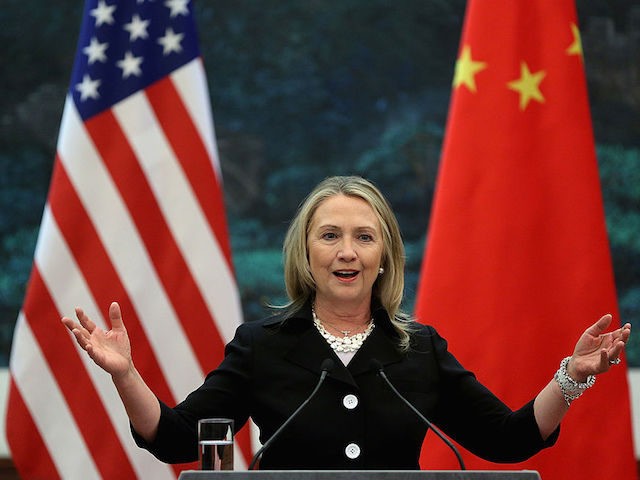In a private speech shortly after leaving her post as Secretary of State, Democratic presidential nominee Hillary Clinton reportedly asserted that China has “a right to assert themselves” with regard to the South China Sea, a region in which the communist government has usurped the sovereign territory of six countries.
Clinton’s statement has been released as part of a compilation of excerpts from private speeches she gave between 2013-2016 by the organization Wikileaks. “The Clinton campaign would not confirm the authenticity of any of the documents but has not disputed the contents,” CNN reported upon their release last week.
In a speech to Goldman Sachs in October 2013, Clinton told the audience that China “basically wants to control” the entire South China Sea, a multi-billion-dollar trade route connecting much of Asia. “48 percent of the world’s trade, obviously that includes energy but includes everything else, goes through the South China Sea,” she said. Of China’s attempts to control the entire body of water, Clinton appeared forgiving.
“You can’t hold that against them,” she reportedly said. “They have the right to assert themselves. But if nobody’s there to push back to create a balance, then they’re going to have a chokehold on the sea lanes and also on the countries that border the South China Sea.”
In the same speech, Clinton reportedly attempted to argue that she did what she could to confront China, arguing that the United States had as much claim to the South China Sea as China did because of World War II.
“I made the point at one point in the argument that, you know, you can call it whatever you want to call it. You don’t have a claim to all of it. I said, by that argument, you know, the United States should claim all of the Pacific. We liberated it, we defended it,” she reportedly told listeners.
“We have as much claim to all of the Pacific. And we could call it the American Sea, and it could go from the West Coast of California all the way to the Philippines. And, you know, my counterpart sat up very straight and goes, well, you can’t do that. And I said, well, we have as much right to claim that as you do,” she continued, according to the text. “I mean, you claim it based on pottery shards from, you know, some fishing vessel that ran aground in an atoll somewhere. You know, we had conveys of military strength. We discovered Japan for Heaven sakes.”
In a speech a month later to the New York Tri-State Of The Market [sic], Clinton reportedly said it was important to curb Chinese expansionism in the region because “40 percent of all of America’s and the world’s trade goes through the South China Sea; because we have defense treaties with five nations, Japan, Korea, Thailand, the Philippines, Australia.”
At the time, China had just debuted the “nine-dash line,” a border Beijing drew in the South China Sea that made 80 percent of that sea into Chinese territory. The “nine-dash line” decrees as China parts of Brunei, Taiwan, Malaysia, Vietnam, and the Philippines, and the waters off the coast of Natuna Island, an Indonesian territory. China had begun to assert itself in the region that year, challenging a U.S. warship there in December.
Since then, China has constructed a series of artificial islands in the Spratly and Paracel Islands, which belong to the Philippines and Vietnam. The Philippines took the case to the Permanent Court of Arbitration at the Hague, where the international court found all of China’s claims invalid. In response, Chinese media outlets blamed pressure from American and Japanese “eunuchs” for the verdict, and Chinese locations of American chains like KFC faced mob attacks.
Clinton’s presidential rival, Republican nominee Donald Trump, has made curbing China’s ambitions (economic and otherwise) a major part of his campaign platform. Chinese officials have anonymously told American media outlets they are concerned about her potential presidency, however. Some experts have speculated, however, that because Clinton is “much more predictable” regarding her approach to dictatorships, she will be a more welcome partner to Beijing than Trump.
Elsewhere in the Wikileaks speech archive, Clinton is quoted as taking credit for the release of Chinese political dissident Chen Guangcheng (who later said that Clinton “gave in” to Beijing in his case) and describing current President Xi Jinping as charming and personable, and his plans to “assert his authority” in China as “a good thing.”

COMMENTS
Please let us know if you're having issues with commenting.